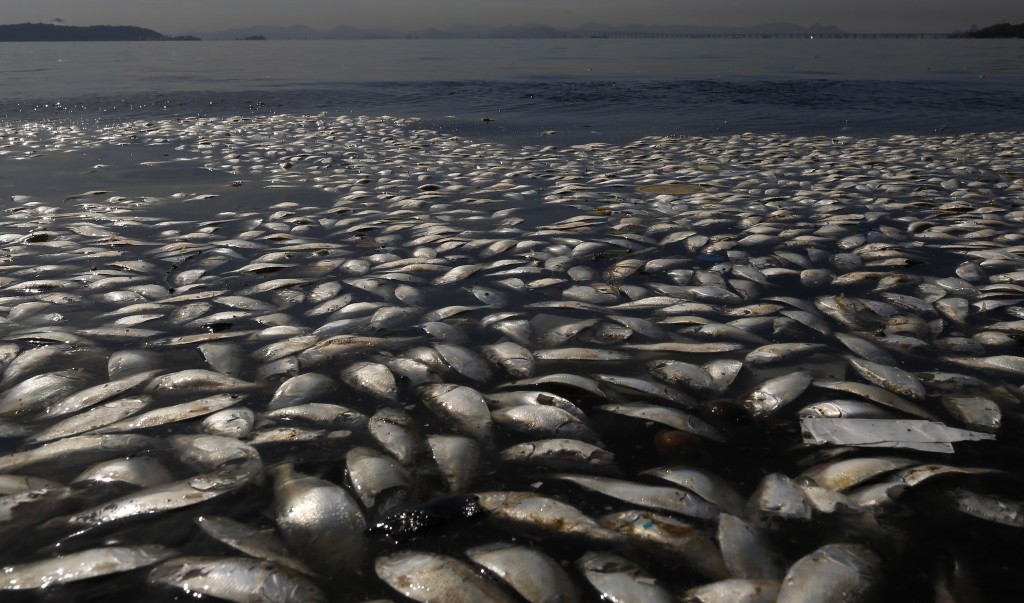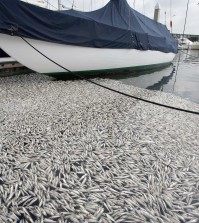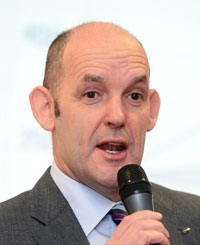- California Assembly OKs highest minimum wage in nation
- S. Korea unveils first graphic cigarette warnings
- US joins with South Korea, Japan in bid to deter North Korea
- LPGA golfer Chun In-gee finally back in action
- S. Korea won’t be top seed in final World Cup qualification round
- US men’s soccer misses 2nd straight Olympics
- US back on track in qualifying with 4-0 win over Guatemala
- High-intensity workout injuries spawn cottage industry
- CDC expands range of Zika mosquitoes into parts of Northeast
- Who knew? ‘The Walking Dead’ is helping families connect
Rio officials probe source of fish die-off in Olympic waters

Dead fish and trash float in the polluted Guanabara Bay in Rio de Janeiro, Brazil, Wednesday, Feb. 25, 2015. Rio de Janeiros state environmental agency is trying to determine why thousands of dead fish have been found floating where next years Olympic sailing events are to be held. (AP Photo/Leo Correa)
RIO DE JANEIRO (AP) — Rio de Janeiro’s state environmental agency says it is investigating a fish die-off that has left thousands of carcasses floating in waters where sailing events are to be held when Brazil hosts next year’s Olympics.
The dead twaite shad, small whitish gray fish, were discovered Tuesday by inspectors conducting routine water testing in Rio’s sewage- and trash-filled Guanabara Bay. The agency was conducting tests to determine the cause of the die-off, with results expected in a week, it said in a statement Tuesday.
The discovery of the fish, which were washing up on the coastline outside Rio’s international airport and about 12 kilometers (7.5 miles) from the starting point for the 2016 Olympic sailing events, comes amid a visit by International Olympic Committee inspectors, in Rio to check up on the city’s progress in preparing for the games.
It also follows upbeat comments by Rio Governor Luiz Fernando Pezao, who said the city was working to meet its pledge to treat 80 percent of the sewage in the sprawling urban area that rings the bay. While the lion’s share of area sewage long has long flowed, raw, into the bay, Pezao said 49 percent of the area’s sewage was now being treated. Still, he acknowledged that Rio is unlikely to meet its goal of 80 percent treatment.
“It’s not easy,” he told reporters at an event in Rio’s subway system on Wednesday. “Every time we have a negotiation, the bidding process (for the project) slows and postpones things.”
The IOC executive director of the Olympic Games, Christophe Dubi, said at a news conference in Rio on Wednesday that it’s his understanding the goal of depolluting Guanabara Bay by 80 percent remains.
“We are still aiming for this goal. We cannot judge until the finish line,” he said. “We are like athletes in that we are pushing toward the finish line and we should respect that every effort is being made.”
Water quality has become a hot-button issue as the Olympics draw closer with little sign of progress in cleaning up the fetid bay, as well as the lagoon system in western Rio that hugs the sites of the Olympic park, the very heart of the games.
The Jacarepagua lagoon system is also filled with sewage and trash, and aerial photos taken Tuesday by the environmental group Olho Verde showed a massive bacterial bloom inside the lagoon that has spilled out onto the Atlantic and a popular nearby beach. Cyanobacteria are single-celled organisms that give the water a vibrant blue-green hue and can sometimes prove toxic to humans and other plant and animal species.
Athletes visiting Rio in recent months for test sailing events complained about health risks and the hazards of encountering floating debris in the waters where they’ll compete.
Despite that, Nawal El Moutawakel, the head of the IOC inspection team in Rio this week, said, “We have been given the assurance that all the venues” will be clean enough “so that athletes can compete in a safe and secure manner.”
Fish die-offs are a common in central Rio’s Rodrigo de Freitas Lake, where the Olympic rowing competitions are to be held. Sometimes after heavy rains, the oxygen levels in the lake drop, killing tons of fish.
The statement from Rio’s environmental agency said tests following a similar die-off of twaite shad in the Guanabara Bay last November showed “neither abnormalities in the water, nor the presence of chemical or toxic substances.
“Therefore,” the statement said, “specialists concluded that the incidents could be related to the intense drought.”
Rio’s O Globo newspaper reported Wednesday that around 60 tons of dead fish were collected in the November die-offs.
















Pingback: Thousands Of Dead Fish Fill The Harbor Of Next Year’s Olympic Site | True Activist
Pingback: Thousands Of Dead Fish Fill The Harbor Of Next Year’s Olympic Site | Forbidden News
https://gamesdro.com/
August 28, 2017 at 1:53 AM
If you are go to this homepage then you can understand that contains a huge no of games which you can play online without any problem
Is
September 17, 2017 at 9:34 AM
Island Locks – Lock Picking – Locksmith Forum – …
kelly
November 24, 2017 at 11:17 AM
Very nice and always successful.
This is a very good article.
I’m waiting for you the other article.
togel online